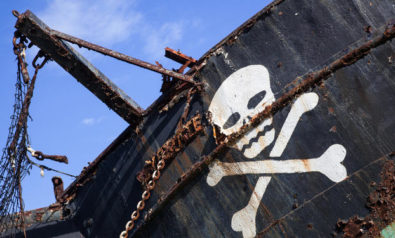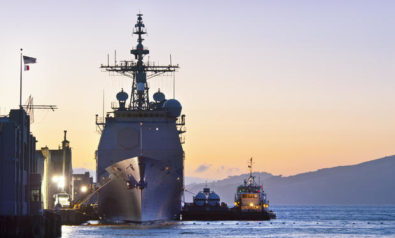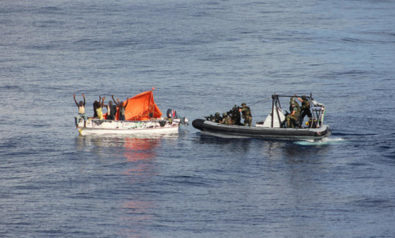Piracy in the Gulf of Guinea could dwarf everything the world has seen in Somalia.
Maritime piracy off the coast of West Africa has replaced Somalia as the most prevalent region for a maritime attack. In fact, Nigeria alone saw a threefold increase from 2011 to 2012, according to the International Maritime Bureau Report.
The increased numbers of these attacks have transformed piracy on the West African coast, from isolated incidents in the Nigerian Niger Delta to a regional epidemic. The Niger Delta of Nigeria plays an important role in the lifecycle of piracy in the Gulf of Guinea.
It is a region engulfed by a decades-old asymmetric conflict between insurgents, the Nigerian state, and oil corporations. The combination of economic destitution and political disenfranchisement by the Nigerian government ignited an uprising by the people of the Niger Delta, claiming autonomy and control of its oil resources.
Early attempts to sabotage Western oil companies and take over the oil fields involved tapping pipelines and selling the oil on the black market. Gradually through internal strife and an increasing involvement of the Nigerian state, groups such as the Movement for the Emancipation of the Niger Delta (MEND) and the later Niger Delta People’s Volunteer Force (NDPV) became increasingly involved in criminal and terrorist activities, expanding their operations gradually from the Niger River Delta coasts all the way in 2008 to Shell’s Bonga Field, 75 miles off-shore.
By 2006, these groups were engaging in piracy regularly as a means of gaining influence vis-à-vis the funding of in-land criminal enterprises and territorial space to fight the Nigerian government.
This “cross pollination” of high seas piracy with in-land criminality has made it difficult for the Nigerian counter-piracy officials to respond effectively. It has become unclear when and to what degree criminality is motivated by financial interests, or if it is motivated by the political aspirations of the people of the Niger Delta to achieve independence.
Regardless of its actual nature, the Nigerian government pursued the pirates by launching intense and sometimes even ruthless counterinsurgency operations. In addition to military operations, the government used economic and social measures to provide assistance to the people of the Niger Delta region.
An economic commission was formed to address what motivates youth to become pirates. The government also negotiated with the pro-Delta region insurgency, eventually offering amnesty for the militants in 2011.
The 2011 amnesty agreement was hailed as a success by the Nigerian government. It led to a significant number of militants laying down their arms, while piracy decreased.
But as a recent threat assessment report of transnational crimes in West Africa produced by the United Nations illustrated, not all militants gave up piracy. Data from the report shows that pirates shifted their activities to Togo and Benin. Nigeria continues to be the undisputed epicenter, but these two countries saw a double-digit increase in attempted attacks in 2011 and 2012.
The Unholy Nexus of Piracy and Drugs
The ease with which Nigerian pirates infiltrate Benin and Togo suggests a level of coordination between pirates and on-land criminal enterprises that is vast and has the potential to spread all along the West African coast. This strong criminalized connection between oil piracy and illegal trafficking on-land is the pivotal danger that is leading to piracy’s impact on all aspect of life in the region, raising a regional security alarm. As the impact of piracy spreads across the region, governments increasingly face oil collaborating off the West African coast.
The pirates assist narco-traffickers in transferring their illicit cargo to land and/or lend them equipment and services. This collaboration expands in-land mostly unchecked, further broadening the zones of lawlessness, undermining stability in the region.
The cause of this expansion is twofold: ineffective governance and corruptible government officials. Piracy in West Africa has expanded primarily because of a poor antipiracy legal framework, accompanied by inadequate law enforcement bodies. At the center of this system of inadequacy stands an army of corrupt government officials, a problem consistent across the whole of West Africa. Across the region, state agencies are so ineffectively managed that civil servants are almost permanently underpaid. With no prospects of a decent salary, many rely on bribes, including from pirates, to sustain their livelihood.
The insufficient protection of the state from bad governance and corruption are key to the expansion of piracy onshore, but tackling them will not bring about the end of piracy in the Gulf of Guinea.
There are three other critical conditions that first need to be addressed: establishing maritime security; managing the effects of the oil booms; and fostering a political climate of addressing effectively the needs of the people.
The Gulf of Guinea is No Horn of Africa
This nontraditional form of piracy in West Africa is new to the continent. In Somalia, the motivation behind attacking vessels on the high-sea is primarily normative and secondary ideological and/or economic. Somalian society is clan-based, with a long tradition of resistance and war against colonial powers and in competition with each other. And yet it is homogenous enough to accommodate changes and trends that are taking place across the country in contrast with the tribal and national level fragmentation, a characteristic central to the Gulf of Guinea.
Also, piracy in the Horn of Africa has been present since historical times due to the geostrategic and commercial prominence of this important maritime passage, as opposed to the recent increase of traffic in the Gulf of Guinea mostly relating heavily to the 20th century introduction of the oil industry.
Another key area of distinction is the connection between piracy and terrorism. In Somalia, the connection between piracy and terrorism has existed now for decades, due to its immediate proximity to the Middle East and North Africa. It has been an early focus for al-Qaeda and references to Somalia and Mogadishu in al-Qaeda’s vocabulary go as far back as Osama bin Laden’s “Declaration of War Against the Americans Occupying the Land of the Two Holy Places,” in 1996.
The Gulf of Guinea’s relevance to jihadist groups is much more indirect and obscure; it is more likely to manifest itself via smuggling of arms and narcotics by pirate groups to the terrorists of Boko Haram and Ansaru or north to the Movement for Oneness and Jihad in West Africa (MOJWA) and al-Qaeda in the Islamic Maghreb (AQIM).
Such transactions may over time nurture the spirit and provide the grounds for a more systematic collaboration of Gulf warlords, with AQIM and Boko Haram creating an alternative “maritime jihadist” link between the two groups.
The Right Approach
Policy recommendations to address this maritime challenge include anticorruption measures; better maritime security strategy and policing; increased corporate accountability regarding oil extraction and related operations; and finally a development geared to driving the coastal population away from piracy via financial incentives.
Such a framework should manifest itself in two levels. First, Nigeria and the nations of the Gulf should increase their antipiracy and counterinsurgency capacities. Second, regional and international crime prevention organizations such as Interpol should coordinate efforts to avoid a further spread of piracy in the region.
Safeguarding of information on routes and other sensitive intelligence regarding commercial shipping, protection against infiltration of shipping-related agencies by criminals and terrorists, and action against corrupted officials must be integral to any antipiracy plan or strategy.
The current security and stabilization operations in Mali and the Sahel, providing a rapid counterterrorism response, should include disruption of routes of trafficking and smuggling of arms, people, and narcotics which link the Gulf of Guinea to the mainland.
Key to countering piracy in the region is economic development, accompanied by a strong legal and law-enforcement framework, tailored to respond to the religious, economic, social, cultural and environmental dimensions of the Niger Delta. It should target organized crime, enforce corporate accountability, and encourage corporate and state social responsibility.
It should also generate opportunities and open space for political parties and communities to participate in decision-making, enjoy a substantial degree of self-determination, and therefore contribute to stronger governance. Such conditions will provide a more sustainable, long-term environment of security in the Gulf of Guinea.
The views expressed in this article are the author’s own and do not necessarily reflect Fair Observer’s editorial policy.
Image: Copyright © Shutterstock. All Rights Reserved
Support Fair Observer
We rely on your support for our independence, diversity and quality.
For more than 10 years, Fair Observer has been free, fair and independent. No billionaire owns us, no advertisers control us. We are a reader-supported nonprofit. Unlike many other publications, we keep our content free for readers regardless of where they live or whether they can afford to pay. We have no paywalls and no ads.
In the post-truth era of fake news, echo chambers and filter bubbles, we publish a plurality of perspectives from around the world. Anyone can publish with us, but everyone goes through a rigorous editorial process. So, you get fact-checked, well-reasoned content instead of noise.
We publish 3,000+ voices from 90+ countries. We also conduct education and training programs
on subjects ranging from digital media and journalism to writing and critical thinking. This
doesn’t come cheap. Servers, editors, trainers and web developers cost
money.
Please consider supporting us on a regular basis as a recurring donor or a
sustaining member.
Will you support FO’s journalism?
We rely on your support for our independence, diversity and quality.









Comment
I suppose facts don’t come into play in this article… The authors clearly don’t understand that piracy off Togo and Benin is the same one that’s driven by Nigerian criminal networks…. as to the Nigerian relation with the narcos: there is no evidence of collaboration except that they belong to similar networks. Yet they fail to mention the most obvious criminal connection: illegal bunkering. They also have many facts wrong: NDVF preceded MEND, not the other way around – and one is a militia, the other is an umbrella organisation. The amnesty was implemented in 2009, not 2011. I’m sure all this could be found if the authors had been a bit more diligent.
The policy recommendation is equally flawed: the nations don’t need more kit for counterinsurgency and anti-piracy, but a functioning regional framework for trans-border law-enforcement, a political will to address maritime security issues and improved maritime governance.
I believe the authors have never before dealt with the issues in this region before.